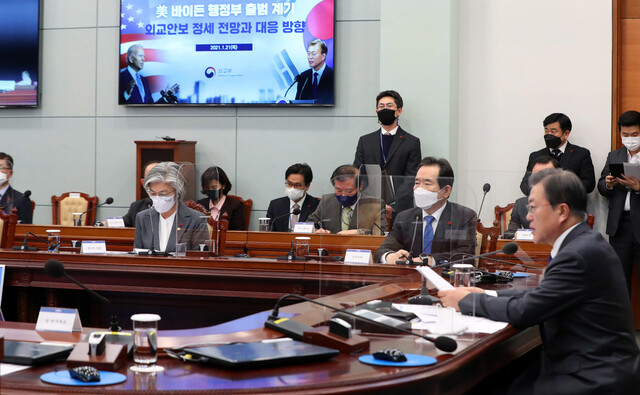NSC General Meeting, Foreign Transportation and Japanese Defense Business Report
Directed to prepare a new breakthrough in North American-South-North dialogue

Prime Minister Chung Sye-gyun and Foreign Minister Kang Kyung-wha attend the plenary meeting of the National Security Council (NSC) held at the Blue House on the afternoon of the 21st and report on the affairs of the Ministry of Foreign Affairs and Security. yunhap news
President Moon Jae-in held the Blue House National Security Council (NSC) on the 21st and instructed the Ministry of Foreign Affairs and Security to make a new breakthrough in North American and North-South dialogues. President Moon, who renewed some of the diplomatic and security lines of the Cabinet and Blue House the day before, stressed that “the peace process on the Korean Peninsula is not an option, but a path that must be followed.” President Moon received a report from the Ministry of Foreign Affairs, Ministry of Unification, and Ministry of National Defense along with the general meeting of the National Security Council at the Blue House on the afternoon of that day. I ask you to do your best to make the clock move again.” President Moon continued, “The government will continue to cooperate closely with the new administration of Biden in the United States to advance the peace process on the Korean Peninsula, and will make every effort to return to the path of dialogue and cooperation with North Korea.” He said, “Please do not rush in a hurry and work with the determination of the last year given to our government. As the master of the fate of the Korean Peninsula, each ministry should cooperate with a more proactive attitude in securing the engine for progress in inter-Korean relations and peace process. President Moon’s remarks appear to convey his willingness to endeavor to resume dialogue between North and South America, as he said in his New Year’s address on the 11th, “I will do my last effort.” President Donald Trump, who had a summit meeting with North Korean leader Kim Jong-un, resigned and President Moon’s term of office remains only one year, but he will not pass it on to his successor as a’deadlock’. The Blue House said that the plenary meeting of the National Security Council on that day was held to forecast the situation in the field of diplomacy and security and discuss the government’s response direction with the official launch of the US administration by Biden. In the presence of President Moon, Prime Minister Jeong Sye-gyun, National Intelligence Service Director Park Ji-won, National Security Office Director Seo Hoon, National Security Office 1st Deputy Director Seo Ju-seok, National Security Office 2nd Deputy Minister Kim Hyung-jin, Foreign Minister Kang Kyung-hwa, Unification Minister Lee In-young, and National Defense Minister Seo-wook reported. The previous day, President Moon reorganized the diplomatic and security line, such as appointing a candidate for Foreign Minister Eui-yong Eui-yong and replacing the second deputy head of the National Security Office Kim Hyun-jong. President Moon pointed out the international situation after the inauguration of the Biden administration, saying that “the order in the Indo-Pacific region including the Korean peninsula is entering a period of rapid transition.” He said, “It is time to make this transition period into our time by further developing cooperative relations with neighboring countries together with a solid ROK-US alliance.” President Moon said, “I look forward to further solidifying the ROK-US alliance,” said President Biden’s administration’s relationship with the United States. “Based on a strong ROK-US alliance, the government will respond more proactively and proactively to the changing international order and security environment. As we progress, we will develop the ROK-US alliance into a more comprehensive and mutually beneficial responsibility alliance.” Next, for the four powers around the Korean peninsula, aiming at “a foundation for a further developed relationship in the wake of the 30th anniversary of diplomatic relations next year” (China), “Development into a future-oriented relationship” (Japan), “Strategic cooperative partnership” (Russia) did. In particular, President Moon expressed the idea that “we should use it as an opportunity for improving Korea-Japan relations and progressing peace in Northeast Asia” through cooperation through this year’s Tokyo Olympics. However, while advocating a peace process on the Korean peninsula, President Moon also emphasized ’50 trillion won in defense expenditures,’ which North Korea responds sensitively. President Moon said, “Strong defense is the foundation of peace,” and said, “In the four years since the Korean government, the defense budget increased by 7%, opening the era of 50 trillion won in defense spending since last year.” By Lee Wan, staff reporter [email protected]
